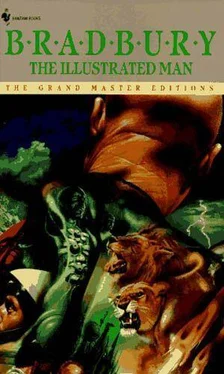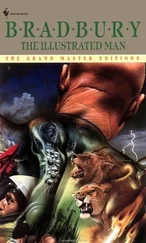Рэй Брэдбери - Человек в картинках (The Illustrated Man), 1951
Здесь есть возможность читать онлайн «Рэй Брэдбери - Человек в картинках (The Illustrated Man), 1951» — ознакомительный отрывок электронной книги совершенно бесплатно, а после прочтения отрывка купить полную версию. В некоторых случаях можно слушать аудио, скачать через торрент в формате fb2 и присутствует краткое содержание. Жанр: Фантастика и фэнтези, на русском языке. Описание произведения, (предисловие) а так же отзывы посетителей доступны на портале библиотеки ЛибКат.
- Название:Человек в картинках (The Illustrated Man), 1951
- Автор:
- Жанр:
- Год:неизвестен
- ISBN:нет данных
- Рейтинг книги:3 / 5. Голосов: 1
-
Избранное:Добавить в избранное
- Отзывы:
-
Ваша оценка:
- 60
- 1
- 2
- 3
- 4
- 5
Человек в картинках (The Illustrated Man), 1951: краткое содержание, описание и аннотация
Предлагаем к чтению аннотацию, описание, краткое содержание или предисловие (зависит от того, что написал сам автор книги «Человек в картинках (The Illustrated Man), 1951»). Если вы не нашли необходимую информацию о книге — напишите в комментариях, мы постараемся отыскать её.
Человек в картинках (The Illustrated Man), 1951 — читать онлайн ознакомительный отрывок
Ниже представлен текст книги, разбитый по страницам. Система сохранения места последней прочитанной страницы, позволяет с удобством читать онлайн бесплатно книгу «Человек в картинках (The Illustrated Man), 1951», без необходимости каждый раз заново искать на чём Вы остановились. Поставьте закладку, и сможете в любой момент перейти на страницу, на которой закончили чтение.
Интервал:
Закладка:
The rocket smelled of time and distance. It was like walking into a clock. It was finished with Swiss delicacy. One might wear it on one's watch fob. "I might even sleep here tonight," Bodoni whispered excitedly.
He sat in the pilot's seat.
He touched a lever.
He hummed in his shut mouth, his eyes closed.
The humming grew louder, louder, higher, higher, wilder, stranger, more exhilarating, trembling in him and leaning him forward and pulling him and the ship in a roaring silence and in a kind of metal screaming, while his fists flew over the controls, and his shut eyes quivered, and the sound grew and grew until it was a fire, a strength, a lifting and a pushing of power that threatened to tear him in half. He gasped. He hummed again and again, and did not stop, for it could not be stopped, it could only go on, his eyes tighter, his heart furious. "Taking off!" he screamed. The jolting concussion! The thunder! "The Moon!" he cried, eyes blind, tight. "The meteors!" The silent rush in volcanic light. "Mars. Oh, God, Mars! Mars!"
He fell back, exhausted and panting. His shaking hands came loose of the controls and his head tilted back wildly. He sat for a long time, breathing out and in, his heart slowing.
Slowly, slowly, he opened his eyes.
The junk yard was still there.
He sat motionless. He looked at the heaped piles of metal for a minute, his eyes never leaving them. Then, leaping up, he kicked the levers. "Take off, damn you!"
The ship was silent.
"I'll show you!" he cried.
Out in the night air, stumbling, he started the fierce motor of his terrible wrecking machine and advanced upon the rocket. He maneuvered the massive weights into the moonlit sky. He readied his trembling hands to plunge the weights, to smash, to rip apart this insolently false dream, this silly thing for which he had paid his money, which would not move, which would not do his bidding. "I'll teach you!" he shouted.
But his hand stayed.
The silver rocket lay in the light of the moon. And beyond the rocket stood the yellow lights of his home, a block away, burning warmly. He heard the family radio playing some distant music. He sat for half an hour considering the rocket and the house lights, and his eyes narrowed and grew wide. He stepped down from the wrecking machine and began to walk, and as he walked he began to laugh, and when he reached the back door of his house he took a deep breath and called, "Maria, Maria, start packing. We're going to Mars!"
"Oh!"
"Ah!"
"I can't believe it!"
"You will, you will."
The children balanced in the windy yard, under the glowing rocket, not touching it yet. They started to cry.
Maria looked at her husband. "What have you done?" she said. "Taken our money for this? It will never fly."
"It will fly," he said, looking at it.
"Rocket ships cost millions. Have you millions?"
"It will fly," he repeated steadily. "Now, go to the house, all of you. I have phone calls to make, work to do. Tomorrow we leave! Tell no one, understand? It is a secret."
The children edged off from the rocket, stumbling. He saw their small, feverish faces in the house windows, far away.
Maria had not moved. "You have ruined us," she said. "Our money used for this – this thing. When it should have been spent on equipment."
"You will see," he said.
Without a word she turned away.
"God help me," he whispered, and started to work.
Through the midnight hours trucks arrived, packages were delivered, and Bodoni, smiling, exhausted his bank account. With blowtorch and metal stripping he assaulted the rocket, added, took away, worked fiery magics and secret insults upon it. He bolted nine ancient automobile motors into the rocket's empty engine room. Then he welded the engine room shut, so none could see his hidden labor.
At dawn he entered the kitchen. "Maria," he said, "I'm ready for breakfast."
She would not speak to him.
At sunset he called to the children. "We're ready! Come on!" The house was silent.
"I've locked them in the closet," said Maria.
"What do you mean?" he demanded.
"You'll be killed in that rocket," she said. "What kind of rocket can you buy for two thousand dollars? A bad one!"
"Listen to me, Maria."
"It will blow up. Anyway, you are no pilot."
"Nevertheless, I can fly this ship. I have fixed it."
"You have gone mad," she said.
"Where is the key to the closet?"
"I have it here."
He put out his hand. "Give it to me."
She banded it to him. "You will kill them."
"No, no."
"Yes, you will. I feel it."
He stood before her. "You won't come along?"
"I'll stay here," she said.
"You will understand; you will see then," he said, and smiled. He unlocked the closet. "Come, children. Follow your father."
"Good-bye, good-bye, Mama!"
She stayed in the kitchen window, looking out at them, very straight and silent.
At the door of the rocket the father said, "Children, we will be gone a week. You must come back to school, and I to my business." He took each of their hands in turn. "Listen. This rocket is very old and will fly only one more journey. It will not fly again. This will be the one trip of your life. Keep your eyes wide."
"Yes, Papa."
"Listen, keep your ears clean. Smell the smells of a rocket. Feel. Remember. So when you return you will talk of it all the rest of your lives."
"Yes, Papa."
The ship was quiet as a stopped clock. The airlock hissed shut behind them. He strapped them all, like tiny mummies, into rubber hammocks. "Ready?" he called.
"Ready!" all replied.
"Take-off!" He jerked ten switches. The rocket thundered and leaped. The children danced in their hammocks, screaming.
"Here comes the Moon!"
The moon dreamed by. Meteors broke into fireworks. Time flowed away in a serpentine of gas. The children shouted. Released from their hammocks, hours later, they peered from the ports. "There's Earth!" "There's Mars!"
The rocket dropped pink petals of fire while the hour dials spun; the child eyes dropped shut. At last they hung like drunken moths in their cocoon hammocks.
"Good," whispered Bodoni, alone.
He tiptoed from the control room to stand for a long moment, fearful, at the airlock door.
He pressed a button. The airlock door swung wide. He stepped out. Into space? Into inky tides of meteor and gaseous torch? Into swift mileages and infinite dimensions?
No. Bodoni smiled.
All about the quivering rocket lay the junk yard. Rusting, unchanged, there stood the padlocked junk-yard gate, the little silent house by the river, the kitchen window lighted, and the river going down to the same sea. And in the center of the junk yard, manufacturing a magic dream, lay the quivering, purring rocket. Shaking and roaring, bouncing the netted children like flies in a web.
Maria stood in the kitchen window.
He waved to her and smiled.
He could not see if she waved or not. A small wave, perhaps. A small smile.
The sun was rising.
Bodoni withdrew hastily into the rocket. Silence. All still slept. He breathed easily. Tying himself into a hammock, he closed his eyes. To himself he prayed. Oh, let nothing happen to the illusion in the next six days. Let all of space come and go, and red Mars come up under our ship, and the moons of Mars, and let there be no flaws in the color film. Let there be three dimensions; let nothing go wrong with the hidden mirrors and screens that mold the fine illusion. Let time pass without crisis.
He awoke.
Red Mars floated near the rocket.
"Papa!" The children thrashed to be free.
Bodoni looked and saw red Mars and it was good and there was no flaw in it and he was very happy.
At sunset on the seventh day the rocket stopped shuddering.
Читать дальшеИнтервал:
Закладка:
Похожие книги на «Человек в картинках (The Illustrated Man), 1951»
Представляем Вашему вниманию похожие книги на «Человек в картинках (The Illustrated Man), 1951» списком для выбора. Мы отобрали схожую по названию и смыслу литературу в надежде предоставить читателям больше вариантов отыскать новые, интересные, ещё непрочитанные произведения.
Обсуждение, отзывы о книге «Человек в картинках (The Illustrated Man), 1951» и просто собственные мнения читателей. Оставьте ваши комментарии, напишите, что Вы думаете о произведении, его смысле или главных героях. Укажите что конкретно понравилось, а что нет, и почему Вы так считаете.






